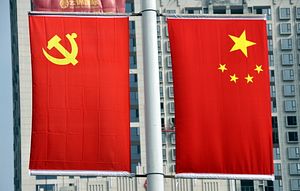As Xi Jinping tries to clamp down on corruption within China’s leaders, a movement is underway to look more closely at the Chinese Communist Party (CCP) as a whole. Xinhua reported on Wednesday that, for the first time in 24 years, the Organization Department of the CCP Central Committee has overhauled the rules on recruiting and admitting new Party members.
The new focus, according Xinhua, will be on quality rather than quantity. The new rules formalize a requirement floated in January 2013 to limit the size of the CCP to provide for more “prudent” and “balanced” growth. The current CCP has over 80 million members, but there’s a growing concern about the number of “unqualified members,” including corrupt officials as well as those who otherwise fail to meet Party standards. Accordingly, the new rules will seek to dismiss current members who are seen as undesirables, while also raising the standards for new members going forward.
As part of this, the new rules called for “stringent discipline” to control Party members. The connection with Xi’s anti-corruption campaign is obvious. Hypothetically, the new rules will allow Party organizations to discipline members before their misdeeds reach the level where legal prosecution is called for.
The new Party rules also reflect Xi’s new emphasis on ideological correctness, which becomes more prominent in the new recruitment rules. Local Party organizations should only seek to absorb “those who believe in Marxism, communism and socialism with Chinese characteristics, and those who practice socialist core values.”
This represents a shift in recent Party policy. In the 1990s, Jiang Zemin revolutionized the CCP through his “Three Represents” theory, which allowed for the inclusion of businessmen and entrepreneurs within CCP ranks rather than limiting membership to the proletariat (traditionally defined as peasants, workers, and soldiers). Accordingly, ideology became less important to membership in the CCP. People sought Party membership as a smart career move, rather than out of any affinity for CCP ideology.
However, Xi Jinping is renewing the CCP’s emphasis on ideology, particularly “socialist core values.” Since assuming office, Xi has sought to emphasize the importance of these values in China’s courts, schools, media outlets, and even on the internet. As Xi tries to promote CCP-defined socialist values, it’s only natural that he would seek to reassert ideological conformity as a key requirement of Party membership.
The new rules on recruitment are only part of a larger trend in which the CCP leadership attempts to assert more control over the Party. Last year, the Party changed the way Party rules are created — documenting formal procedures for the first time in the CCP’s history. As South China Morning Post reported at the time, many analysts saw the move as Xi’s attempt to bring the “rule of law” to bear on the CCP itself. As with many of X’s reforms, the reform of the Party itself is designed to give the central authorities more control over various local and grassroots branches.
As Zach pointed out yesterday, getting local leaders to back Beijing’s reforms has been a challenge. One way to combat this problem is to tighten central control over the Party — after all, local officials are also CCP members. By controlling the recruitment of new members, and streamlining the disciplinary process for existing members, Xi and company are hoping to create a more centralized Party governance system that will translate into more power for Beijing.
































